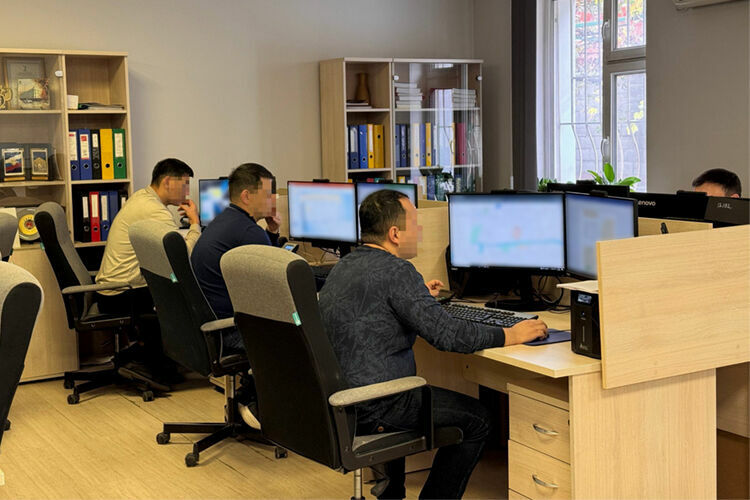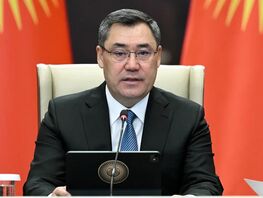A fundamentally new state-run national early warning mechanism for the emergence of new drugs, psychoactive substances, pre-precursors, and their analogues has been launched in Kyrgyzstan.
At a press conference at the State Service on Drug Control of the Ministry of Internal Affairs of Kyrgyzstan, it was announced that the early warning mechanism (EWM), aimed at protecting the population from new-generation drug threats, includes two key components: the Republican Monitoring Center (RMC) under the Ministry of Internal Affairs of the Kyrgyz Republic and the Commission on Drugs and Drug Addiction (CDDA).
Timur Isakov, Chairman of the Commission on Drugs and Drug Addiction, noted the importance of the timely implementation of the mechanism for monitoring uncontrolled psychoactive substances and narcotic drugs.
«The UN General Assembly, the International Narcotics Control Board, and the UN Office on Drugs and Crime have recommended that each state implement monitoring. In this regard, our country has launched an early warning mechanism for the emergence of such substances,» Timur Isakov said.
The mechanism, approved by a Cabinet of Ministers resolution of July 31, 2025, represents a unified interdepartmental preventive control tool that ensures the prompt identification and assessment of the risks of dangerous substances before their widespread circulation.
The creation of this mechanism represents Kyrgyzstan’s transition to a systemic and scientifically based response to modern drug threats. Decisions on introducing new substances under control will now be made based on analysis, forecasting, and early detection, rather than post-factum. The mechanism aims to reduce the time between the first signal of a new substance’s emergence and its actual introduction under state control, thereby protecting society, and especially young people, from dangerous synthetic compounds.
The Republican Monitoring Center serves as the analytical and coordinating center, collecting information from ministries, agencies, laboratories, and scientific institutions, analyzing the data, and classifying new compounds. All collected information is submitted to a commission, which reviews the data, conducts expert discussions, and formulates unified recommendations for the Cabinet of Ministers. The commission includes representatives from 21 government agencies—the Ministry of Internal Affairs, the Ministry of Health, the Ministry of Economy and Commerce, the Ministry of Justice, the State Committee for National Security, the State Customs Service, the Prosecutor General’s Office, and others.
The commission chairman emphasized that a similar mechanism for identifying early warning signs of threats from certain new substances exists in Europe.
«These substances are not technically narcotics, but are psychoactive substances that can seriously harm the human body,» he emphasized. «This trend began to actively spread worldwide in 2014. New modifications of psychoactive substances and outdated medications are emerging that pose a danger to the human body and can be used recreationally. They are released into circulation, which is not technically illegal, but can pose a health risk.»
Timur Isakov added that neither the UN system nor national authorities are able to quickly assess these substances, resulting in them remaining in circulation for years. The new mechanism was introduced to reduce processing and notification times. He expressed hope that not only Kyrgyzstan but also other neighboring states would incorporate this mechanism into their hazardous substance monitoring systems, as it is always easier to identify threats together.
This system works well in European countries. One of them receives information about the emergence of a suspicious substance, it is immediately distributed to all competent EU authorities, and a rapid assessment begins.
Timur Isakov
Executive Secretary of the Commission on Drugs and Drug Addiction Zulkhumar Borboeva noted that this mechanism is unique in all of Central Asia. Kyrgyzstan is the first country to implement this system. She emphasized that it is now necessary to implement it in all countries in the region. The mechanism aims to reduce the time between the first signal about the appearance of a new substance and its actual introduction under state control, thereby protecting society, and especially young people, from dangerous synthetic compounds.
RCM Head Marsel Dootaliev told journalists that new psychoactive substances and their compositions are changing very quickly today. He expressed hope that the new mechanism will prevent distribution and provide early warning of dangers. He added that, thanks to the efforts of representatives of the Commission on Drugs and Drug Addiction, accountability for pharmacy addiction has been strengthened.
Particular attention is being paid to monitoring medications with potential for non-medical use, as well as developing preventative recommendations and raising public awareness.







